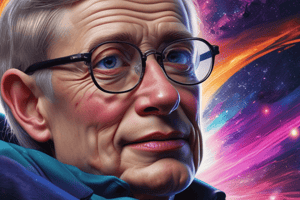Podcast
Questions and Answers
What year was Stephen Hawking born?
What year was Stephen Hawking born?
- 1940
- 1941
- 1942 (correct)
- 1943
What university did Stephen Hawking attend to obtain his first-class degree in physics?
What university did Stephen Hawking attend to obtain his first-class degree in physics?
- Oxford
- Cambridge
- Trinity Hall
- University College (correct)
What did Stephen Hawking's father advise him to study?
What did Stephen Hawking's father advise him to study?
- Mathematics
- Physics
- Medicine (correct)
- Applied Mathematics
What did Stephen Hawking become a professor of in 1974?
What did Stephen Hawking become a professor of in 1974?
What did Stephen Hawking publish in 1985?
What did Stephen Hawking publish in 1985?
Flashcards are hidden until you start studying
Study Notes
- Stephen Hawking was born on January 8, 1942, in Oxford, England.
- Hawking had a first-class degree in physics from University College, Oxford and a PhD in applied mathematics and theoretical physics from Trinity Hall, Cambridge.
- Hawking was diagnosed with motor neuron disease at the age of 21 and was gradually paralysed over the next several decades.
- In the late 1970s and following the publication of further research, the discovery of Hawking radiation was widely accepted as a major breakthrough in theoretical physics.
- Hawking was a vigorous supporter of the many-worlds interpretation of quantum mechanics.
- Hawking's scientific works include a collaboration with Roger Penrose on gravitational singularity theorems in the framework of general relativity, and the theoretical prediction that black holes emit radiation, often called Hawking radiation.
- Hawking's work in cosmology and quantum mechanics has been highly influential. He was ranked number 25 in the BBC's poll of the 100 Greatest Britons in 2002. Hawking died in 2018 at the age of 76.
- Hawking attended University College, Oxford, where he studied mathematics and physics.
- He was not initially successful academically, but he began to show considerable aptitude for scientific subjects and, inspired by his physics tutor, decided to read mathematics at university.
- Hawking's father advised him to study medicine, concerned that there were few jobs for mathematics graduates.
- He also wanted his son to attend University College, Oxford, his own alma mater.
- Hawking developed into a popular, lively, and witty college-member, interested in classical music and science fiction.
- Part of the transformation resulted from his decision to join the college boat-club.
- The rowing-coach at the time noted that Hawking cultivated a daredevil image, steering his crew on risky courses that led to damaged boats.
- Hawking estimated that he studied about 1,000 hours during his three years at Oxford.
- He decided to answer only theoretical physics questions rather than those requiring factual knowledge for his first-class degree, and he planned to study cosmology at the University of Cambridge.
- Hawking was born on May 14, 1942 in Oxford, England
- He studied physics at the University of Oxford and obtained a first-class BA in 1962
- He completed his graduate work at Trinity Hall, Cambridge in October 1962 and started his post-graduate studies there in October 1964
- In 1965, he wrote his thesis on the creation of the universe and submitted it for approval
- In 1970, he and James M. Bardeen and Brandon Carter proposed the four laws of black hole mechanics
- In 1974, he was appointed professor of mathematics at the University of Cambridge
- In 1979, he was diagnosed with motor neurone disease and began receiving treatment
- In 1985, he published his best-selling book A Brief History of Time
- In 1989, he was awarded the Nobel Prize in Physics
- He retired from his professorship in 1995 and now lectures at the University of Cambridge
Hawking has made significant contributions to the fields of cosmology, quantum field theory, and black hole mechanics. He has also pioneered the use of mathematical models in the study of physical phenomena. Some of his most significant achievements include the following:
- The discovery of the theory of general relativity, which provides a unified description of the laws of motion for objects in space and time
- The development of the singularity theorem, which shows that the universe may have begun as a singularity
- The proposal of the theory of black hole dynamics, which describes the behavior of objects inside a black hole
- The development of the four laws of black hole mechanics, which describe the physical properties of black holes in terms of the laws of classical mechanics
- The development of the mathematical models that are now used to study a wide range of physical phenomena
- Hawking was born on March 14, 1942, in Oxford, England.
- He was diagnosed with ALS in 1963 and given two years to live.
- He became a world-renowned physicist, mostly for his work on black holes and the universe's beginning.
- In 1974, he published results that black holes emit radiation.
- This discovery was initially controversial, but has since been widely accepted.
- Hawking was elected a Fellow of the Royal Society in 1974 and a professor at Cambridge in 1977.
- In 1979, he was elected Lucasian Professor of Mathematics at Cambridge.
- He retired from his professorship in 2009.
Studying That Suits You
Use AI to generate personalized quizzes and flashcards to suit your learning preferences.




